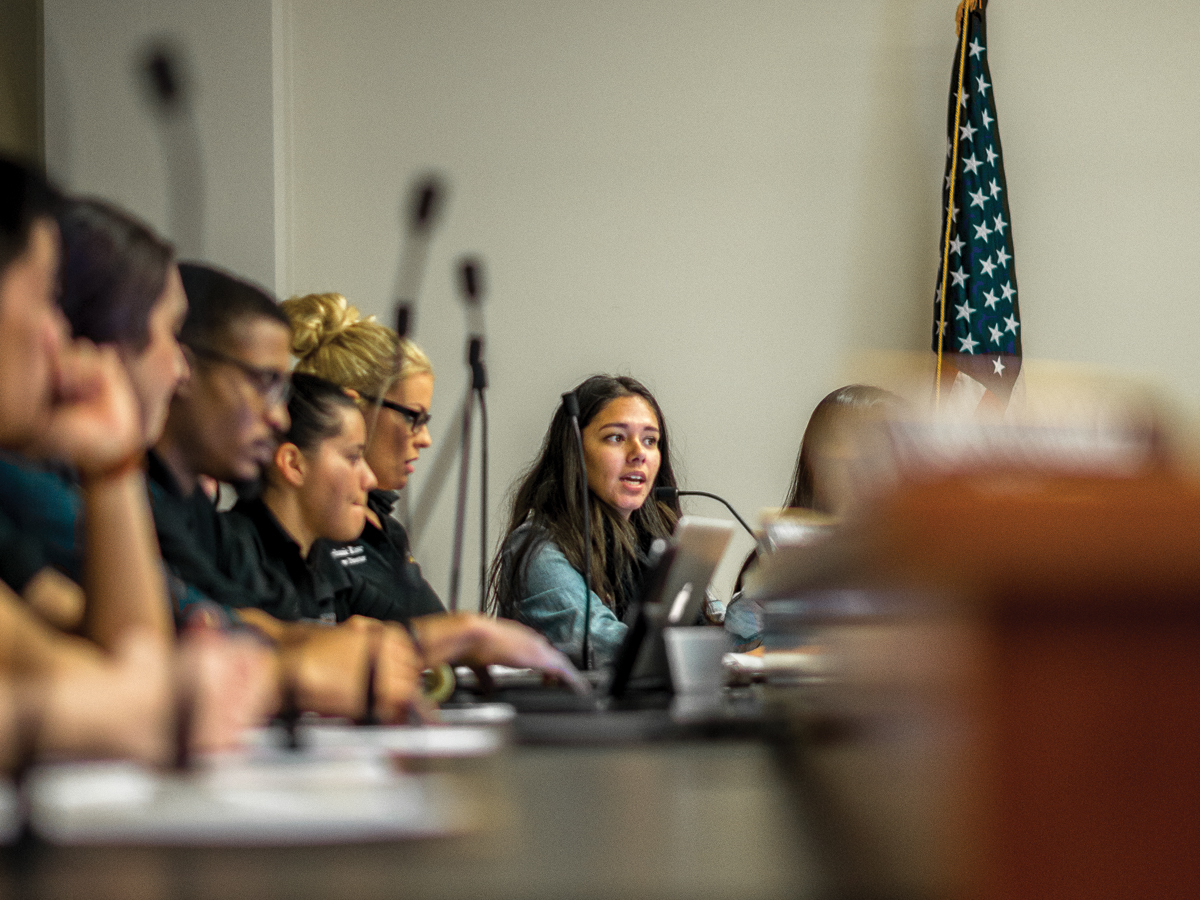
Members of ASUCR unanimously passed a resolution last week expressing “no confidence” in the UC Board of Regents and UC President Janet Napolitano in the wake of the recently approved UC tuition plan. Another notable resolution was also passed, which urges UCPD personnel to complete 16 hours of ethnic and gender studies courses as protests over police brutality continue to spread throughout the nation.
The tuition resolution was written by the representatives of three student governments: UC Berkeley, UC Riverside and UCLA. The resolution was presented and passed at these three UCs, with a similar resolution also passed at UC Irvine.
According to Vice President of External Affairs Abraham Galvan, the resolution comes at a time when students are “just fed up” with Napolitano and the regents “actively (going) against student concerns in multiple scenarios” and taking minimal input from students about the tuition increases. Galvan furthered that students were not informed about the tuition plan until two weeks before it was voted on and approved by the regents on Nov. 20.
Some students felt that the UC failed to provide adequate notice of the tuition hikes, which does not comply with the provisions of AB 970, a two-year-old state law requiring Cal State University trustees and UC regents to notify students 30 days in advance before tuition increases are expected.
Due to the law, which says that the UC need only comply with its provisions “to the extent that the regents act by resolution to make them applicable,” and UC’s autonomy in the California constitution, the UC has thus far not complied with it. If the regents were to comply, it would mandate that the UC notify students of proposals for fee increases at least seven days before posting notice of action to increase said fees, provide a justification for fee proposals and disclose what the revenue from the fee increases would be used for.
Galvan also says that it is a problem that most of the regents, including Napolitano, have never worked in education before, causing students to “question their ability to govern our university.”
The resolution addresses each of these issues, stating that, “ASUCR believes that the current level of student involvement within the regents panel … does not constitute meaningful shared governance,” and condemns the regents and president “for failing to implement the provisions of AB 970.”
The resolution was passed through a standing order, a type of vote which puts a resolution into effect indefinitely, as opposed to expiring at the end of the year like most resolutions.
The resolution states that ASUCR will “maintain no confidence” in the UC leadership until a list of demands is met, which includes the repeal of the tuition plan, full implementation of the provisions of AB 970 and the creation of a task force with student, faculty and administration representation, which, along with the California Department of Finance, would be “charged with investigating the budget of the (UC) and submitting a report of its findings.”
The goal of the resolution, Galvan says, is to “express (student) discontentment with the regents” and to maintain no confidence in their ability to lead the UC until the demands put forth in the resolution are met.
In an interview with the Highlander, Senator Delaynie Koenig expressed her support for the resolution, stating that the UC can take greater measures to improve the lives of students. She hopes that “as a world-class educational system, the UC can both aspire to and implement the policies that represent and benefit the hardworking students that give these regents their jobs.”
Also addressed at the meeting was Senator Akeem Brown’s resolution to urge UCPD to take ethnic and gender studies classes, which passed by 15-0-1.
Through the resolution, the UCPD chief of police would encourage personnel to take courses, which will consist of 16 hours spread out over two consecutive weekends. The ethnic and gender studies department heads would work with ASUCR members to craft courses, which would eventually be taught by senators themselves beginning in the spring of 2015.
While the spirit of the resolution was widely supported by ASUCR, several senators expressed concerns about the budget for the project, which many felt was not clearly outlined in the resolution. However, Brown explained that the resolution was merely a “strong recommendation,” and that the details regarding the $2,500 he was requesting for the project would be explained in a subsequent resolution.
The part of the resolution that promised that the courses would be made “free of charge” was found by senators to be too great an obligation for a resolution whose budget details they did not have. Thus, the resolution was amended to replace the word “free” with a promise that “ASUCR will make a good faith effort to make sure this course is free for those who enroll,” a change that Galvan feels leaves “(ASUCR) a little wiggle room.”
Fourth-year student Shane Brandon supports the resolution. “Frankly, I think this program should have been put in place years earlier,” he said. “This may not be a truly effective solution for solving the problem completely, but I do at least think it’s a good start.”








